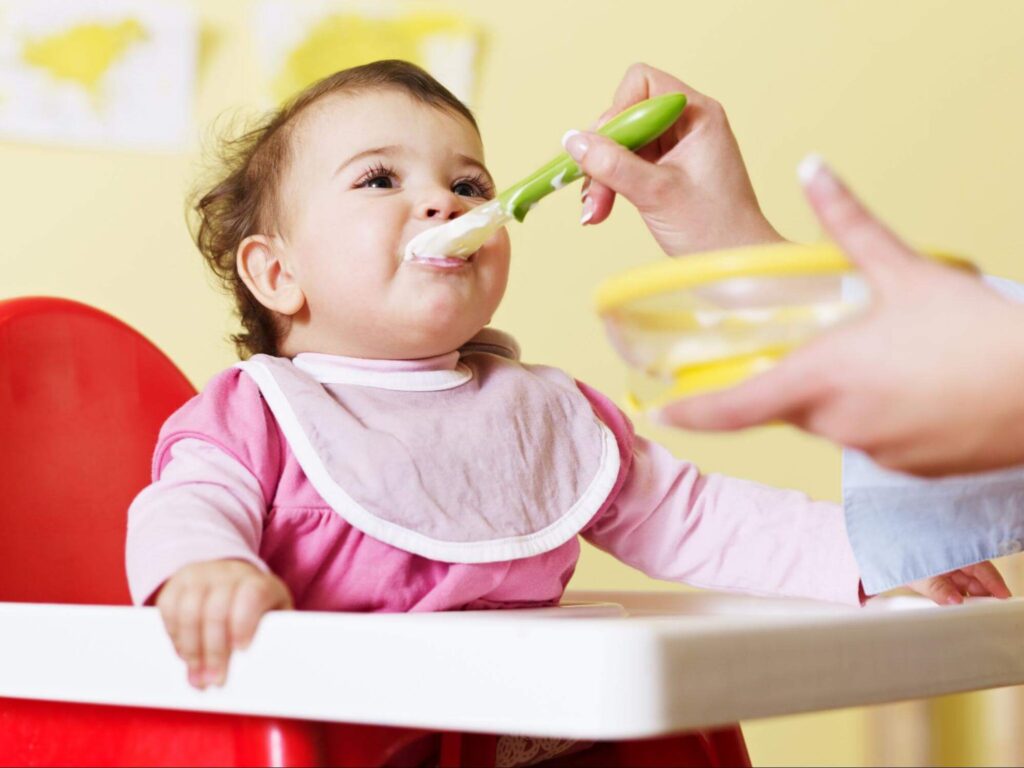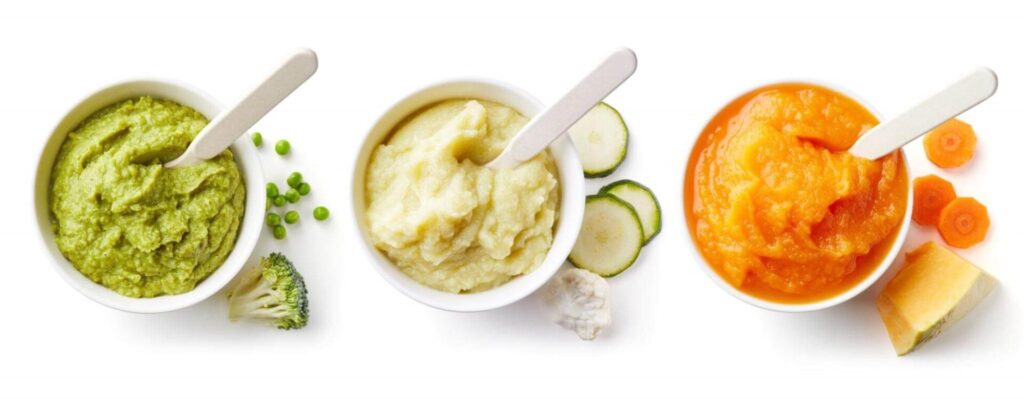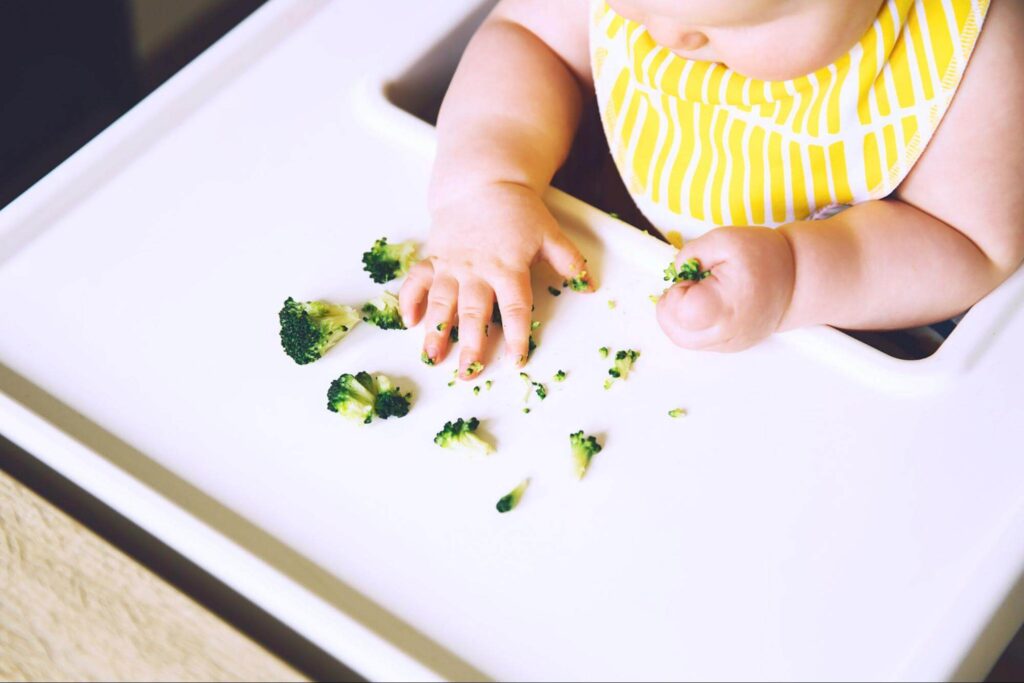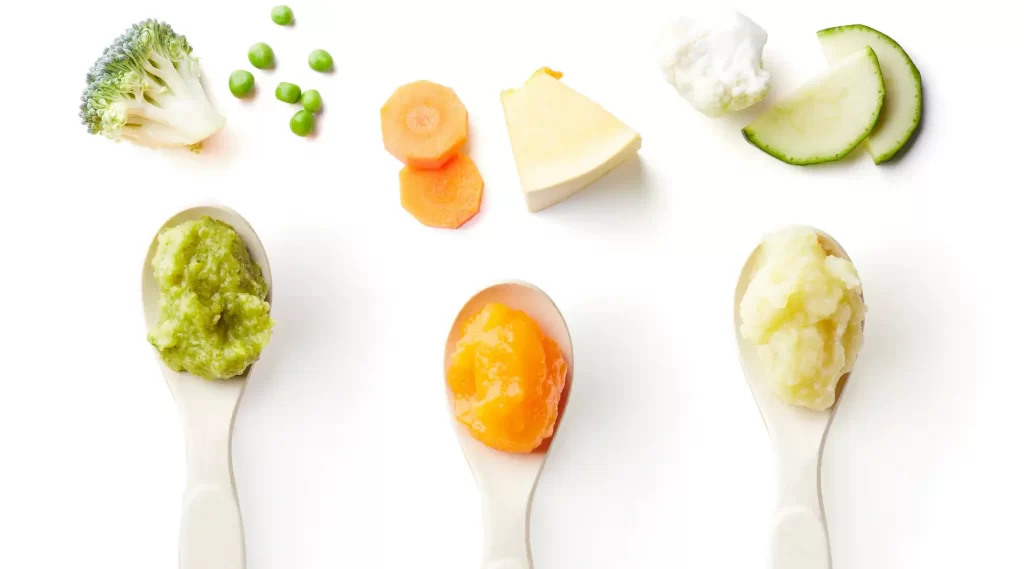Starting solids is a wonderful and exciting time for you and your baby. In this article we’ll talk about the age to start solids (hot tip you don’t need a calendar, you baby will tell you!) The benefits of purees and baby lead weaning. How breast milk and formula milk will remain your babies primary source of nutrition even as you introduce solids and the most common allergens you’ll need to test ideally between 4-6 months.
When do you recommend baby’s start solids?
There’s no set age to start your baby on solid food – you need to watch your baby for signs of readiness not the calendar.
Signs your baby is ready to start solids:
- more frequent night waking and catnapping during the day
- your baby watching you more intently when you are eating and seeming more interested
- reaching for food as you try to eat
- putting objects in their mouth more often
Babies do NOT need trunk control (ie: sitting independently) to be able to start solids, only need head control and can be safely fed in a ‘fitted’ high-chair, bouncer, parent’s lap, etc.

The benefits of starting solids at the first sign of readiness
In the Dr Golly Sleep Program I recommend introducing solids around the four month mark has a number of benefits.
Firstly, it can take several weeks of practice before your baby is confidently taking decent volumes of solids at each meal, meaning it could be a while before they’re taking in enough calories to provide adequate energy to last the night.
Secondly – international allergy guidelines point to strong evidence that we can reduce the lifetime risk of allergies by introducing common allergens (triggers) in a window between 4 to 6 months.
So delaying solids has the potential to increase the chances of having allergies to things like nuts, eggs or fish.
Wait ….don’t baby’s need to be exclusively breast fed until 6 months? Doesn’t the WHO say this?
Remember, solids at this stage are considered ‘complements’ to milk be it breast milk or infant formula milk, not replacement.
The breast milk or formula is still the most important part of their nutritional intake so it is an opportunity for baby and parents to learn about different smells, textures and flavours.
The Dr Golly Sleep Program aligns with The Australasian Society of Clinical Immunology and Allergy (ASCIA) in recommending no solids prior to 4 months.
The WHO guideline was projected to save more than 820,000 infant lives annually – an incredible figure, but this is in 3rd world countries, where it’s necessary to take into consideration whether there is access to clean water for solids preparation.
Infants differ in the age they are ready for solids, and every breastfeeding mother differs in the amount of milk able to be produced.
This is why it’s important to look for signs of readiness/hunger in your baby, not a specific age.
What types of puréed food to start with?
Start with purees of fruit and vegetables such as sweet potato, pumpkin, carrot, peas, zucchini, pear and apple.
Be careful not to quickly introduce too many foods that can cause wind in babies, like green beans, cauliflower or broccoli.
Infant cereal is also a great first food; it should be iron-fortified. Particularly for vegetarian/vegan families, the iron-rich plant-based foods are very high in fibre so need to be introduced a bit more delicately.
As your baby starts to grow the text will change from a smooth puree to a more lumpy mashed foods.

What is Baby-led weaning?
Baby-led weaning is a completely novel approach to starting solids. It involves skipping the pureed-food stage and moving straight to small solids or finger foods, which the baby manipulates and self-feeds.
Given the developmental needs required for this, babies will not be taking adequate solids volume until at least 8-9 months of age.
What’s the best approach to introducing solid foods – baby lead weaning or purees?
It’s important to follow the lead of each individual baby when you introduce solid foods and to use a combination of both conventional feeding techniques as well as baby-led weaning to help them build independence in feeding skills.
Feed your baby pureed food, while at the same time, letting them explore food independently, both pureed (yes, encourage a mess!) and more textured simultaneously.

Remember: This requires close supervision, up-to-date baby first aid training and a willingness to have messy fun!
The most common foods that are choking hazards for children and babies include:
- Marshmallows
- Grapes
- Whole nuts
- Boiled lollies
Packet baby food
Packet/pouch food is amazingly convenient – it’s affordable, sterile, mobile. It’s absolutely OK to use packet food, but we recommend you read the label.
We are yet to find one that has the recommended protein we advice for the lunch time feed.
If you find one, tell us!
Food Allergies and Starting Solids
Food allergies are on the rise in developed countries, with significant public health impact. Serious allergy (anaphylaxis) can greatly hinder the quality of life for both children and parents.
What are the most common food allergens?
The most common food allergies are to:
- cow’s milk
- egg
- Peanut
- tree nuts including cashew, walnut and pistachio
- Fish
- Shellfish
- wheat
- Soy
- seasame
Most children will outgrow a food allergy to egg, milk, soy and wheat – but it’s less likely they’ll grow out of allergies to nuts and seafood – though these may decrease in severity over time.
When should I introduce allergens?
- Advice from ASCIA (the allergy governing body) recommends introducing complementary foods (including introduce potentially allergenic foods) in the window of 4-6 months.
- Introducing allergens in the 4-6 month window is associated with the lowest incidence of allergy for children.
In the Dr Golly Programs we have a full guide for starting solids and testing allergens that your family can work through
Expert on Allergens: Allergist Dr Dean Tey
What are some other things to keep in mind when starting solids?
There are some specifics to remember:
- Heated or cooked egg should be introduced between 6-8 months
- Honey should be avoided until 12 months of age (not for reasons of allergy, but due to the possibility of contamination with botulinum toxin – botox, which can be found in honey).




